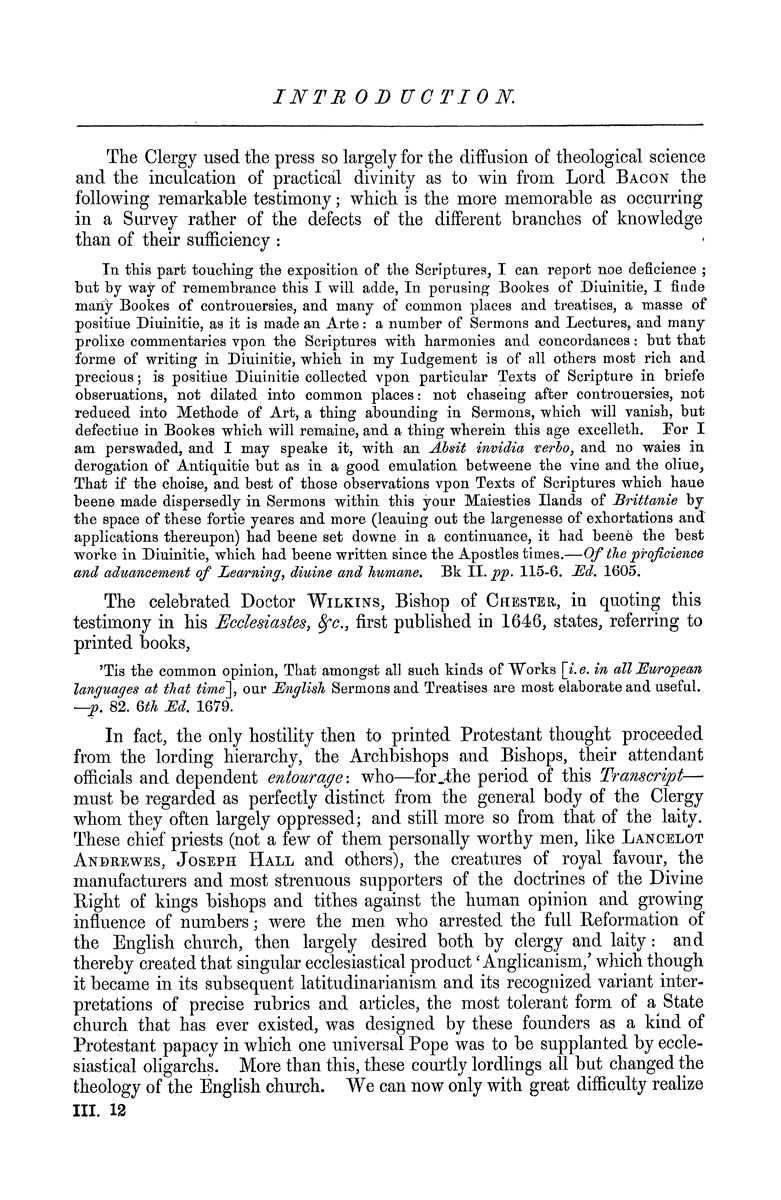INTB OB UCTION.
The Clergy used the press so largely for the diffusion of theological science
and the inculcation of practical divinity as to win from Lord Bacon the
following remarkable testimony; which is the more memorable as occurring
in a Survey rather of the defects of the different branches of knowledge
than of their sufficiency :
In this part toucMng the exposition of the Scriptures^ I can report noe deficience ;
but by way of remembrance this I will adde, In perusing Bookes of Diuinitie, I finde
maiiy Bookes of controuersies, and many of common places and treatises, a masse of
positiue Diuinitie, as it is made an Arte: a number of Sermons and Lectures, and many
prolixe commentaries vpon the Scriptures with harmonies and concordances: but that
forme of writing in Diuinitie, which in my ludgement is of all others most rich and
precious; is positiue Diuinitie collected vpon particular Texts of Scripture in briefe
obseruations, not dilated into common places: not chaseing after controuersies, not
reduced into Methode of Art, a thing abounding in Sermons, which will vanish, but
defectiue in Bookes which will remaine, and a thing wherein this age excelleth. For I
am perswaded, and I may speake it, with an Ahsit invidia verbo, and no waies in
derogation of Antiquitie but as in a good emulation betweene the vine and the oliue.
That if the choise, and best of those observations vpon Texts of Scriptures which haue
beene made dispersedly in Sermons within this your Maiesties Hands of Brittanie by
the space of these fortie yeares and more (leaning out the largenesse of exhortations and
applications thereupon) had beene set downe in a continuance, it had beene the best
worke in Diuinitie, which had beene written since the Apostles times.—Of the proficience
and aduancement of Learning, diuine and humane, Bk II. pp. 115-6. Ed, 1605.
The celebrated Doctor Wilkins, Bishop of Chester, in quoting this
testimony in his Ecdesiastes, 8fc., first pubhshed in 1646, states, referring to
printed books,
'Tis the common opinion, That amongst all such kinds of Works [i. e. in all European
languages at tliat time'], our English Sermons and Treatises are most elaborate and useful,
—p. 82. 6th Ed, 1679.
In fact, the only hostility then to printed Protestant thought proceeded
from the lording hierarchy, the Archbishops and Bishops, their attendant
officials and dependent entourage \ who—for^the period of this Transcript—
must be regarded as perfectly distinct from the general body of the Clergy
whom they often largely oppressed; and still more so from that of the laity.
These chief priests (not a few of them personally worthy men, like Lancelot
Andrewes, Joseph Hall and others), the creatures of royal favour, the
manufacturers and most strenuous supporters of the doctrines of the Divine
Right of kings bishops and tithes against the human opinion and growing
influence of numbers; were the men who arrested the full Reformation of
the English church, then largely desired both by clergy and laity: and
thereby created that singular ecclesiastical product 'Anglicanism,' which though
it became in its subsequent latitudinarianism and its recognized variant inter¬
pretations of precise rubrics and articles, the most tolerant form of a State
church that has ever existed, was designed by these founders as a kind of
Protestant papacy in which one universal Pope was to be supplanted by eccle¬
siastical oligarchs. More than this, these courtly lordUngs all but changed the
theology of the English church. We can now only with great difficulty realize
III. 12
|








